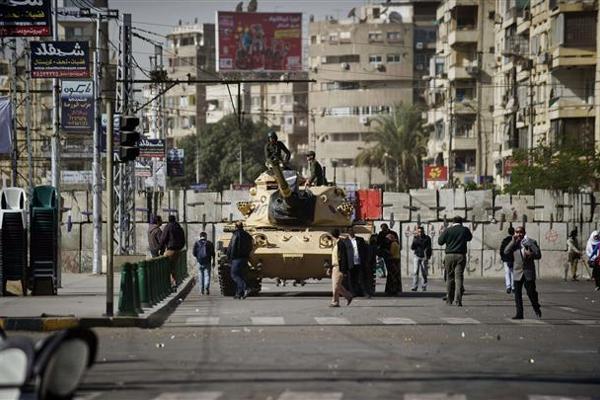Morsi relies on army to secure referendum
CAIRO


An Egyptian army tank is deployed near the Presidential Palace in Cairo as opposition supporters and people walk by yesterday. President Mohamed Morsi has ordered Egypt’s army to ‘cooperate’ with police and given it power of arrest. AFP photo
Egypt’s President Mohamed Morsi has ordered the army to take on police powers, including the right to arrest civilians, ahead of the Constitutional referendum that has already polarized the country.The decree takes effect on the eve of mass rival protests on the referendum, which is set to be held on Dec. 15, and follows street clashes that have left several people dead and hundreds injured.
It orders the military to fully cooperate with police “to preserve security and protect vital state institutions for a temporary period, up to the announcement of the results from the referendum,” according to a copy of the decree obtained by Agence France-Presse. The decree gave army officers the right to make arrests and transfer detainees to prosecutors.
Despite its limited nature, the edict will revive memories of Hosni Mubarak’s emergency law, also introduced as a temporary expedient, under which military or state security courts tried thousands of political dissidents and militants. Emergency law was in place in Egypt from 1981 until May this year.
A Cabinet source said ministers had reviewed the latest decree last week, saying troops had secured elections during a military-run transition after Mubarak, but with a civilian president now in charge they needed a decree to allow them to play that role, Reuters has reported.
The army has deployed tanks and troops since Dec. 6 around the Presidential Palace but these have not yet confronted the thousands of protesters who have gathered there every night. F-16 fighter jets also made low passes over the center of Cairo in a rare maneuver by the air force over the capital on Dec. 9.
Main opposition group to boycott referendum
The main opposition group, the National Salvation Front, led by liberals such as Mohamed ElBaradei and Amr Moussa, as well as leftist firebrand Hamdeen Sabahy, called for huge protests to be held today in Cairo to boycott the referendum, arguing that it was impossible against a background of Muslim Brotherhood “intimidation.” The referendum was “grossly irresponsible” and would cause “cause further division and polarization,” it claimed.
“We do not recognize the draft Constitution because it does not represent the Egyptian people,” National Salvation Front spokesman Sameh Ashour told a news conference. Cairo schools informed parents they would be closed as precaution today.
Former presidential candidate and founder of the Strong Egypt Party, Abdel-Moneim Abul-Fotouh, called on all Egyptians to vote “no” in the referendum, saying the draft Constitution does not achieve the demands of the Jan. 25 revolution, according to al-Ahram. The opposition views the new Constitution as undermining human rights, the rights of women, religious minorities, and curtailing the independence of the judiciary. Morsi supporters have urged their followers to turn out “in millions” in a show of support for the president and for a referendum they feel sure of winning with their loyal base and perhaps with the votes of the many Egyptians weary of turmoil.
Mahmoud Ghozlan, the Muslim Brotherhood’s spokesman, said the opposition were able to stage protests, but should keep the peace. So far, the army and police have taken a relatively passive role in the protests roiling the country. The elite Republican Guard has yet to use force to keep protesters away from the presidential palace, where clashes with Morsi supporters killed seven people and wounded 350 last week.
Egypt’s Morsi stops tax rises
CAIRO - Agence France-Presse
Egyptian President Mohamed Morsi has suspended tax rises on a range of products, including alcohol and cigarettes, in an apparent bid to woo the electorate ahead of Dec. 15’s referendum on a new charter.
Morsi issued the decision overnight and tasked his prime minister, Hisham Qandil, to start talks on the taxes “so as not to increase the burden on citizens,” official MENA news agency reported yesterday. The tax hikes, also affecting steel, cement, mobile-phone and other products, were part of budget efforts Egypt has agreed to make to secure a $4.8 billion loan from the International Monetary Fund.
